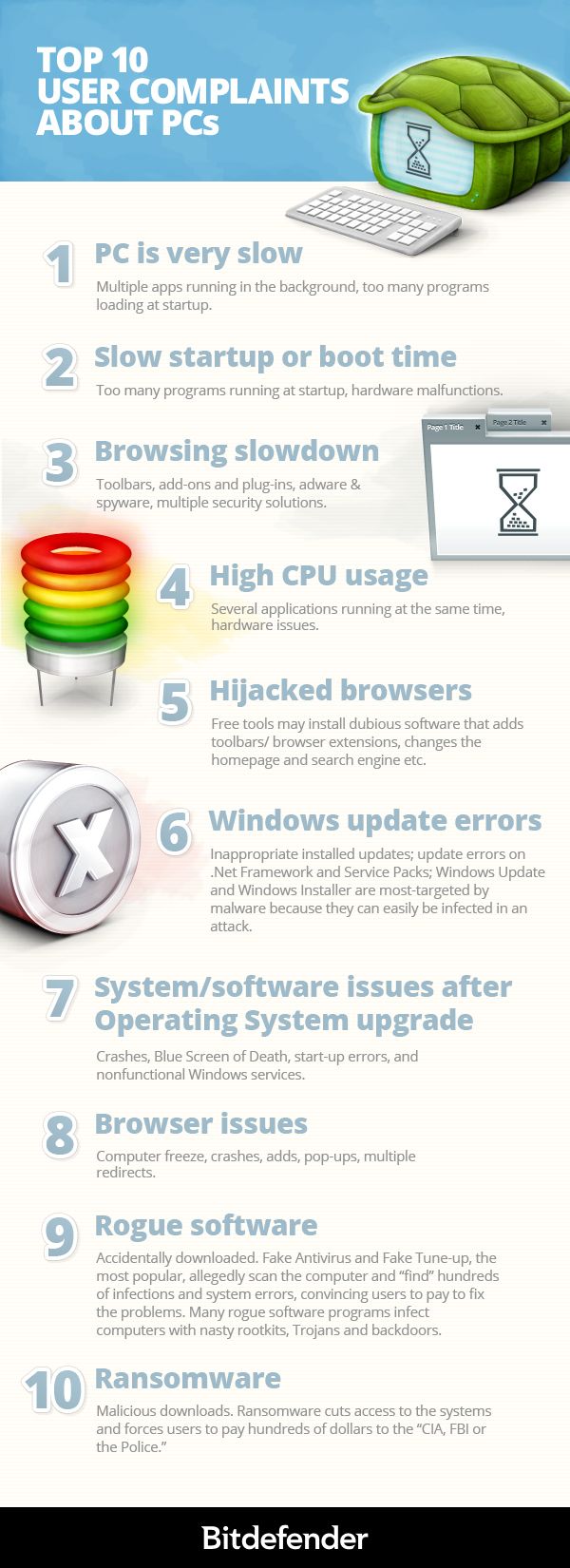Top 3 PC User Peeves: System Slowdown, Sluggish Startup and Browser Lag

PC slowdowns, lengthy startups and sluggish browsing are the most common peeves of computer users, according to antivirus software provider Bitdefender. To pinpoint the causes of common gripes, the security company outlined the top 10 technical problems that users face with their computers.
Most users complain their PCs are aging and can no longer cope with newly installed software because of poor processors and RAM memories. General slowdown is also caused by excessive fragmentation (a fragmentation rate of more than 20 per cent on HDD), hard disks with low health rates or bad sectors.
 “Like humans, PCs suffer congestion, slowdowns and even viruses if not properly taken care of,”Bitdefender Tech Assist Architect Florin Andrei said. “An overload of applications that open at startup, improperly uninstalled software, and an avalanche of temporary files are the computer equivalent of sleepless nights and unhealthy addictions. A common phenomenon that slows computers down is bloatware – crowded toolbars, software preinstalled by the manufacturer and programs that users donâ’t really need but are installed with free tools or accidentally downloaded.”
“Like humans, PCs suffer congestion, slowdowns and even viruses if not properly taken care of,”Bitdefender Tech Assist Architect Florin Andrei said. “An overload of applications that open at startup, improperly uninstalled software, and an avalanche of temporary files are the computer equivalent of sleepless nights and unhealthy addictions. A common phenomenon that slows computers down is bloatware – crowded toolbars, software preinstalled by the manufacturer and programs that users donâ’t really need but are installed with free tools or accidentally downloaded.”
Many users install several security suites on their computers, believing they can better fight malware in this way. Unfortunately, antivirus programs have similar features that interfere with each other and consume the same resources, causing even more problems on the computer.
Here are the Top 10 user complains about PCs, together with the main causes Bitdefender Tech Assist identified remotely:
1. PC is very slow – multiple apps running in the background, too many programs loading at startup.
2. Slow startup or boot time – too many programs running at startup, hardware malfunctions.
3. Browsing slowdown – toolbars or different add-ons and plug-ins, adware and spyware, multiple security solutions.
4. High CPU usage – several applications running at the same time, hardware issues.
5. Hijacked browsers – free tools may install dubious software that adds toolbars/browser extensions, changes the homepage and search engine etc.
6. Windows update errors – inappropriate installed updates; update errors on .Net Framework and Service Packs; Windows Update and Windows Installer are most targeted by malware that can easily be infected in an attack.
7. System/software issues after Operating System upgrade – crashes, Blue Screen of Death, start-up errors, and nonfunctional Windows services.
8. Browser issues – computer freeze, crashes, adds, pop-ups, multiple redirects.
9. Rogue software – accidentally downloaded. The most popular are Fake Antivirus and Fake Tune-up, which allegedly scan the computer and “find” hundreds of infections and system errors, convincing users to pay for a license to fix the problems. Many rogue software programs infect computers with nasty rootkits, Trojans and backdoors.
10. Ransomware – malicious downloads. Ransomware cuts access to the systems and forces users to pay hundreds of dollars to the “CIA, FBI or the police.”Â
At the same time, a recent Bitdefender study of more than 1,000 advanced computer users revealed they are four times more concerned about slow performance than about catching viruses. The research in the US and Canada also showed that crashing applications and hardware problems have left most people disappointed with their computers.
For other tips and tricks that will help improve PC performance, users may also check the Bitdefender Tech Assist recommendations.
tags
Author
Bianca Stanescu, the fiercest warrior princess in the Bitdefender news palace, is a down-to-earth journalist, who's always on to a cybertrendy story.
View all postsRight now Top posts
How to Protect Your WhatsApp from Hackers and Scammers – 8 Key Settings and Best Practices
April 03, 2025
Outpacing Cyberthreats: Bitdefender Together with Scuderia Ferrari HP in 2025
March 12, 2025
Streamjacking Scams On YouTube Leverage CS2 Pro Player Championships to Defraud Gamers
February 20, 2025
How to Identify and Protect Yourself from Gaming Laptop Scams
February 11, 2025
FOLLOW US ON SOCIAL MEDIA
You might also like
Bookmarks








